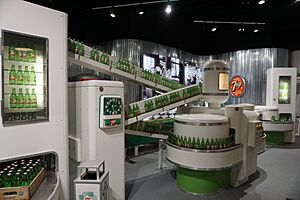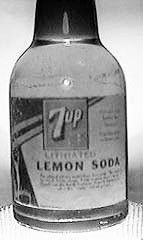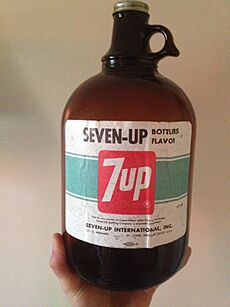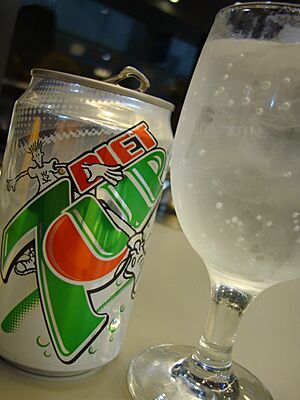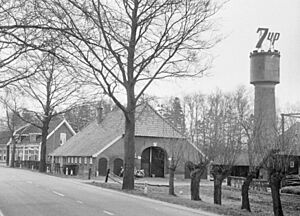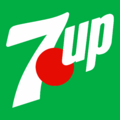7 Up facts for kids
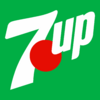 
American and international logos used since 2024 and 2023, respectively
|
|
| Type | Lemon-lime drink |
|---|---|
| Manufacturer | Keurig Dr Pepper PepsiCo (international distribution only) |
| Distributor | PepsiCo |
| Country of origin | United States |
| Introduced | August 7, 1928 (as SEVEN UP) |
| Color | Colorless Pink (Cherry/Diet Cherry, United States only) |
| Variants |
List
dnL (discontinued)
7 Up Plus (discontinued) 7 Up Ten Tropical 7 Up 7 Up nimbooz 7 Up nimbooz masala soda (India) 7 Up Retro (outside of the U.S.) Diet 7 Up 7 Up Zero Sugar Cherry 7 Up Diet Cherry 7 Up Cherry 7 Up Zero Sugar Orange 7 Up Raspberry 7 Up 7 Up Free 7 Up Free Mojito (UK, Ireland, Germany) 7 Up Light zero 7 Up Lime 7 Up Cherry (UK) 7 Up Mojito (France) 7 Up Gold (discontinued) 7 Up Revive 7 Up Ice Cola (discontinued) 7 Up Citrus Splash (discontinued) 7 Up Lemon Squeeze (discontinued) 7 Up Tropical (France) 7 Up Tropical Splash (discontinued) 7 Up Pomegranate (discontinued) 7 Up Frootaz (discontinued) 7 Up Yerbabuena (discontinued) 7 Up Shirley Temple (discontinued) |
| Related products | Mitsuya Cider, Sprite, Bubble Up, Starry |
7 Up (also known as 7UP around the world) is a popular American brand of lemon-lime flavored soft drink. It does not contain caffeine. The company that owns the brand and its secret recipe is Keurig Dr Pepper. However, PepsiCo helps distribute 7 Up in many countries outside the United States.
Contents
History of 7 Up
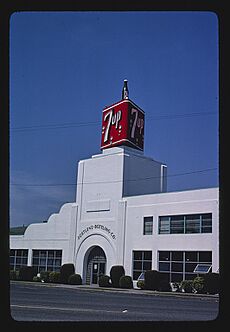
7 Up was invented by Charles Leiper Grigg. He started his company, The Howdy Corporation, in St. Louis in 1920. Grigg created the recipe for this lemon-lime soft drink in 1929. It was launched just two weeks before a big event called the Wall Street Crash of 1929.
There's a story that the drink was first called "Bib-Label Lithiated Lemon-Lime Soda." However, it seems this long name might not have been its actual official name. The drink did claim to have "lithium citrate" in it at first. This was a common thing for many products in the early 1900s, which were sometimes sold as "patent medicines."
The word "Bib-Label" actually referred to how a paper label was hung around the bottle's neck, like a bib. The name "SEVEN-UP" was officially registered in 1928. By 1937, the government made the company remove any health claims. Since lithium was not a main ingredient, the name was simply changed to "7 Up."
The exact reason for the name "7 Up" is not fully clear. Some people think it comes from the seven main ingredients in the drink. Others believe the number "7" was a nod to the element lithium, which was in the original recipe and has an atomic mass of 7. Another idea is that 7 Up bottles were seven ounces, while most other soft drinks like Coca-Cola came in six-ounce bottles.
Over the years, 7 Up has been owned by different companies. In 1978, Philip Morris bought the company. Later, in 1986, it was split. PepsiCo took over the international part, and a group led by Hicks & Haas bought the U.S. business. Eventually, the U.S. 7 Up business joined with Dr Pepper to form Dr Pepper/Seven Up. Today, it is part of Keurig Dr Pepper.
How People Enjoy 7 Up
7 Up is usually enjoyed cold, either straight from the fridge or with ice. It's also a popular ingredient in many mixed drinks and punches. People often use it to add a bubbly, lemon-lime flavor to their favorite non-alcoholic beverages.
The 7 Up Recipe
The recipe for 7 Up has changed a few times since it first came out. In 2006, the 7 Up sold in the U.S. was changed so it could be advertised as "100% natural." This meant removing certain ingredients and changing others to lower the sodium. This version uses high-fructose corn syrup (HFCS) for sweetness.
However, some groups questioned if a drink with HFCS could truly be called "100% natural." So, in 2007, 7 Up changed its advertising. Now, it says it has "100% Natural Flavors." In other countries, like the United Kingdom, HFCS is not commonly used in 7 Up. Since 2011, 7 Up has also offered a special version called "7 Up Retro" in the U.S., which is made with real sugar instead of HFCS.
Different Kinds of 7 Up
Over the years, many different flavors and versions of 7 Up have been created. Some are still available, while others were only sold for a short time.
Popular Varieties in the United States
- 7 Up: This is the classic lemon-lime soda, first launched in 1929.
- Cherry 7 Up: Introduced in 1987, this version has a cherry flavor and a pink color. It was briefly called "Cherry 7 Up Antioxidant" but later returned to its original formula.
- 7 Up Gold: This was a spice-flavored drink from 1988. It was unusual because it contained caffeine, which went against 7 Up's usual "Uncola" marketing. It was discontinued quickly.
- dnL: Launched in 2002, this was a green, caffeinated version of 7 Up, meant to compete with other popular citrus sodas. It was discontinued in 2006.
- Pomegranate 7 Up: A special pomegranate-flavored drink sold during the holiday season from 2007 to 2010, and sometimes brought back for limited times.
- 7 Up Retro: This version, introduced in 2011, uses real cane sugar instead of corn syrup. Its packaging often features older 7 Up logos.
- Tropical 7 Up: A pineapple and mango flavored drink that has been sold for limited times, including a return in 2023 at certain stores.
- Simple 7 Up: A newer natural version from 2022, made with filtered water, cane sugar, and stevia leaf extract.
- Shirley Temple 7 Up: A cherry and pomegranate flavored drink launched in 2024, inspired by the famous non-alcoholic mixed drink.
- 7 Up Hecho en Mexico: This is regular 7 Up that is made and imported from Mexico. It uses real cane sugar and comes in glass bottles.
Low-Calorie 7 Up Options
- 7 Up Zero Sugar: This is the no-calorie version of 7 Up. It was first introduced in 1963 as "Like" and has changed names several times, including "Diet 7 Up" and "Sugar Free 7 Up," before becoming "7 Up Zero Sugar" in late 2020.
- Cherry 7 Up Zero Sugar: This is the low-calorie version of Cherry 7 Up, rebranded in late 2020.
- 7 Up Plus: A range of healthy, low-calorie drinks launched in 2004. They had no caffeine and included a small amount of apple juice. They came in flavors like Mixed Berry, Cherry, and Island Fruit.
- 7 Up Ten: Introduced in 2013, this version has only ten calories per serving. It uses a mix of high-fructose corn syrup and artificial sweeteners.
- Tropical 7 Up Zero Sugar: A low-calorie mango and pineapple flavored drink, sold exclusively at Kroger-owned stores since 2023.
International 7 Up Flavors
Many unique 7 Up flavors have been sold in different countries around the world:
- 7 Up with Cherry on Top: A cherry-flavored variety sold in the UK and France.
- Orange 7 Up: An orange-flavored version sold in various countries like Canada, Thailand, and Germany.
- Raspberry 7 Up: A raspberry-flavored drink sold in parts of Europe and Asia.
- 7 Up Revive: A special version sold in India and Laos, marketed as an isotonic drink (which helps with hydration).
- 7 Up Free / 7 Up Light / 7 Up Zero Sugar: These are the low-calorie alternatives to Diet 7 Up sold in many countries outside the U.S.
- 7 Up Mojito: A mint-flavored variety first released in France, and later in Belgium and Germany.
- Salted Lemon 7 Up: A unique variant sold only in Hong Kong, which contains salted lemon. It's a popular local drink.
7 Up in Barbecue Sauces
In 2007, the company that owned 7 Up at the time, Cadbury Schweppes, partnered with Vita Food Products. They created a line of barbecue sauces and marinades that were flavored with Dr Pepper, 7 Up, and A&W Root Beer.
7 Up Advertising Campaigns
7 Up has had many memorable advertising campaigns over the years.
In the 1950s, a rooster named "Fresh-Up Freddie" was the mascot. He appeared in commercials, often made by Disney, teaching people how to host great parties with 7 Up. Freddie was sometimes shown fighting with Pete the Cat.
From the late 1960s to the 1980s, actor Geoffrey Holder was featured in 7 Up's "Uncola" ad campaign. This campaign aimed to show how 7 Up was different from other soft drinks, especially colas. Geoffrey would hold "Uncola nuts" (a lemon and a lime) to highlight 7 Up's unique flavor.
In 1987, 7 Up introduced "Spot," a cartoon mascot based on the red-orange dot in the 7 Up logo. Spot became very popular and was featured in many advertisements and even in video games like Cool Spot (1993) and Spot Goes to Hollywood (1995).
The cartoon character Fido Dido was also used as a mascot for 7 Up in many countries outside the U.S. from the late 1980s onwards.
In the early 2000s, actor Orlando Jones was the spokesperson for 7 Up in the United States. He appeared in a series of commercials, including one where he wore a T-shirt with the slogan "Make 7 Up Yours," which was a clever play on words.
Corporate Support
In 1974, 7 Up became the very first company to sponsor The Jerry Lewis MDA Labor Day Telethon. This was a big step, as the telethon had mostly been supported by unions and community groups before that.
Images for kids
See also
 In Spanish: 7 Up para niños
In Spanish: 7 Up para niños
 | Victor J. Glover |
 | Yvonne Cagle |
 | Jeanette Epps |
 | Bernard A. Harris Jr. |


